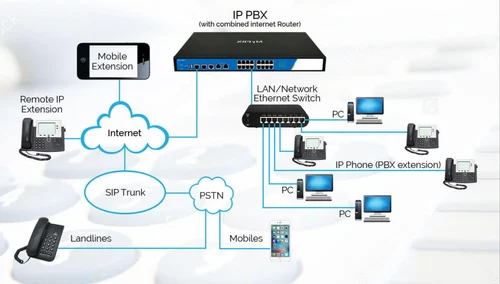Demystifying IVR and IP-PBX: Enhancing Communication Efficiency
In today's fast-paced business environment, effective communication is key to success. Technologies like Interactive Voice Response (IVR) and Internet Protocol Private Branch Exchange (IP-PBX) have revolutionized the way organizations manage their telecommunications, leading to streamlined processes and improved customer interactions. Let's delve deeper into the world of IVR and IP-PBX to understand their functionalities, benefits, and the impact they have on modern communication systems.
Introduction
In the digital age, businesses rely heavily on efficient communication systems to connect with customers, partners, and employees. IVR and IP-PBX play a crucial role in facilitating seamless communication processes and enhancing overall productivity. By automating tasks and streamlining call routing, these technologies offer a range of benefits that contribute to a more efficient and customer-centric approach to communication.
Understanding IVR
Interactive Voice Response (IVR) is a technology that enables automated interactions with callers through voice or keypad inputs. When customers dial a service number and are greeted with a menu of options, they are engaging with an IVR system. These systems are designed to efficiently route calls, handle basic inquiries, and even facilitate transactions without the need for human intervention.
IVR systems provide pre-recorded information, collect caller input through voice or keypad responses, and transfer calls to live agents when necessary. By offering self-service options and guiding callers to the right department, IVR enhances efficiency and ensures a seamless customer experience.
Exploring IP-PBX
Internet Protocol Private Branch Exchange (IP-PBX) is a telephony system that operates over an IP network, such as the internet, rather than traditional phone lines. Serving as a central hub for call routing within an organization, IP-PBX integrates voice and data communication into a single network infrastructure.
Unlike conventional PBX systems that require separate networks for voice and data, IP-PBX consolidates communication channels, leading to cost savings and simplified management. With features like call forwarding, voicemail, conferencing, and CRM integration, IP-PBX empowers businesses to optimize their communication workflows and boost productivity.
Benefits of IVR and IP-PBX
Improved Efficiency: IVR systems reduce the need for human intervention in handling routine inquiries, allowing organizations to manage a higher call volume with fewer resources.
Enhanced Customer Experience: By offering self-service options and directing callers to the right department promptly, IVR systems minimize wait times and ensure timely assistance for customers.
Cost Savings: IP-PBX leverages internet-based communication, reducing reliance on traditional phone lines and lowering long-distance call charges. Additionally, the integration of voice and data networks eliminates the need for separate infrastructures, leading to cost efficiencies.
Scalability: Both IVR and IP-PBX systems are highly scalable, enabling organizations to expand or modify their communication setup easily as their requirements evolve.
Analytics and Reporting: These systems provide valuable insights into call metrics, customer interactions, and service quality, enabling data-driven decision-making to enhance overall performance.
Future Trends and Innovations
As technology advances, IVR and IP-PBX systems continue to evolve to meet the changing demands of businesses and consumers. Some emerging trends in this space include:
AI-Powered IVR: Integration of artificial intelligence and natural language processing to create more intuitive and context-aware IVR systems.
Unified Communications: Integration of IP-PBX with various communication channels for a unified platform that includes email, instant messaging, and video conferencing.
Cloud-Based Solutions: Adoption of cloud-based IVR and IP-PBX systems for enhanced flexibility, scalability, and accessibility across organizations.
Security Enhancements: Implementation of advanced security measures to safeguard against fraud, identity theft, and data breaches in voice communication systems.
Conclusion
In conclusion, IVR and IP-PBX technologies have become indispensable tools for modern businesses seeking to streamline communication processes, enhance customer experiences, and achieve cost efficiencies. By embracing these technologies and staying abreast of emerging trends, organizations can position themselves at the forefront of innovation and drive greater efficiency in their communication strategies. As IVR and IP-PBX systems continue to evolve and integrate with other technologies, they will play a pivotal role in shaping the future of telecommunications and business communication.
"For any queries, contact us." https://wa.me/+911413501286
